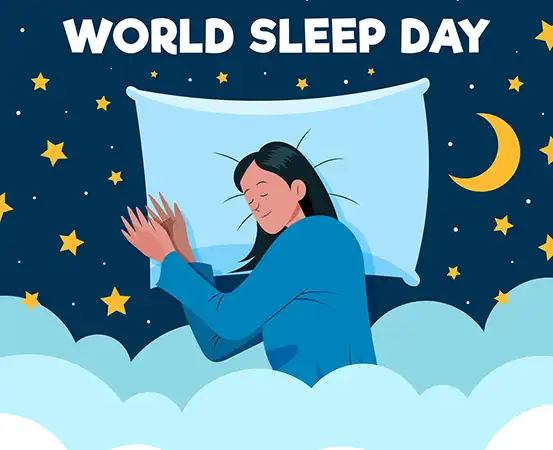Getting well-rested sleep is one of the most fundamental physiological needs a person must satisfy for better physical, mental and emotional well-being. Experts say that a sleep deprivation can affect children and adults alike.
How much sleep does one need?
Centers for Disease Control and Prevention (CDC) recommends that an adult should ideally get at least seven hours of well-rested sleep. According to their estimation, about one in three adults are not able to achieve this. Sleep deprivation also has different patterns among children and adults.
Dr Shantanu Tandon, senior ENT surgeon, airway and sleep apnea specialist, Sakra World Hospital, Bengaluru, says, “According to various sleep data, kids between the age group of three and five should be getting ten to 13 hours of sleep a day, and six to 12-year-olds should sleep nine to 12 hours every night. But, sadly, around 25-35 percent of growing children and adolescents are sleep deprived.”
Furthermore, diagnosing sleep deprivation in children and adults is increasingly difficult due to the unique patterns. While adults convey tiredness and lack of sleep, children cannot. Adding to this, Dr Tandon says, “sleep-deprived kids are often irritable, hyperactive, forgetful and have difficulties with emotional regulation. We also see lack of attention, poor decision-making and decreased memory, all of which can affect academic achievement.”
Understanding sleep deficiency
Many researchers have also conducted extensive studies on the effect of sleep deficiency. One such research conducted by Sumi Rose and Sonumol Ramanan examines the impact of sleep deprivation on the Academic Performance and Cognitive Functions of college students.
The conclusion of the study states that academic performance and cognitive functions are poor in students who are sleep deprived.
Dr Tandon says, “Sleep deficiencies and sleep apnoea cause an effect on hormones and growth and can cause childhood obesity. Prolonged deprivation can also be associated with depression, anxiety, early-onset hypertension, and heart disease. ADHD and lack of sleep can mimic each other and confuse the diagnosis further.”
Other harmful consequences of sleep deprivation are diabetes, mood fluctuations, low alertness, poor renal function and respiratory issues.
Factors affecting sleep
Environmental, physical and psychological factors often play a huge role in causing sleep deprivation. Some of the common reasons that cause the occurrence of sleep deprivation are:
- Sleeping at the wrong hours of the day
- Not getting enough sleep
- Sleep is disrupted/uncompleted
- Have a pre-existing sleep disorder that causes low-quality sleep (for example, sleep apnoea)
- Chronic pain
- Depression
- Bruxism
- Substance abuse
- Fatigue syndrome
- Narcolepsy
- Schizophrenia
Explaining the difference between insomnia and sleep deprivation, Dr Sarah Silverman, a Stanford-trained sleep psychologist and holistic sleep wellness consultant practising in New York and Florida, says, “Insomnia means you’re having difficulty falling asleep and or you wake up during the night and can’t get back to sleep. It could also mean you wake up much earlier in the morning than you’d like and experience poor sleep quality or unrefreshing sleep.”
Difference between Insomnia and Sleep deprivation
If you’re experiencing insomnia, it means you have adequate opportunity to sleep (i.e., nothing is getting in the way of your night’s sleep), but your ability to sleep is reduced (usually due to stress, anxiety, worry about sleep, etc).
If you’re experiencing sleep deprivation, on the other hand, your opportunity to sleep is reduced (i.e., something is getting in the way of your night’s sleep), but your ability to sleep is fine (i.e., if your opportunity to sleep wasn’t reduced, you’d be sleeping). Classic examples of sleep deprivation include (but are not limited to) having a newborn baby, working shift work or night shift, and/or an untreated sleep disorder like sleep apnoea, restless legs syndrome, etc.
How to treat insomnia?
Usually, doctors will ask a person multiple questions regarding his/her sleeping patterns. It will help the person get a better grip on the case for the diagnosis. Depending on the type of sleep disorder diagnosed, the doctor will provide a treatment plan. Most doctors emphasise lifestyle changes to correct sleep deprivation.
Consult a doctor
While sleeping patterns differ from person to person and are distinct for different age groups, it is recommended that one should see a doctor in case of the following:
- Often feels sleepy during the day
- Don’t feel rested, refreshed or alert after waking up
- Have trouble adjusting to a shift in work timings
How to sleep better ?
To overcome sleep deprivation, people can follow sleep habits, generally called ‘the sleep hygiene‘ which can help them achieve a good night’s sleep.
Dos
- Eat a small snack before bedtime if hunger disturbs the sleep
- Low lights to be maintained one to two hours before bedtime
- Say no to gadgets in bed
- A warm bath or shower at least 30 minutes to one hour before sleep will help change the body temperature which could help one sleep well
- Have a bedtime routine. Maintaining habits like brushing teeth can help
- Have melatonin-rich foods in evening with or after dinner — eg, goji, berries, glass of warm milk
Avoid
- Heavy, spicy meals and alcohol, two to three hours before bedtime
- Excess liquids
- Consuming caffeine during late evenings
- Nicotine before bedtime
- Exercising right before going to bed


















